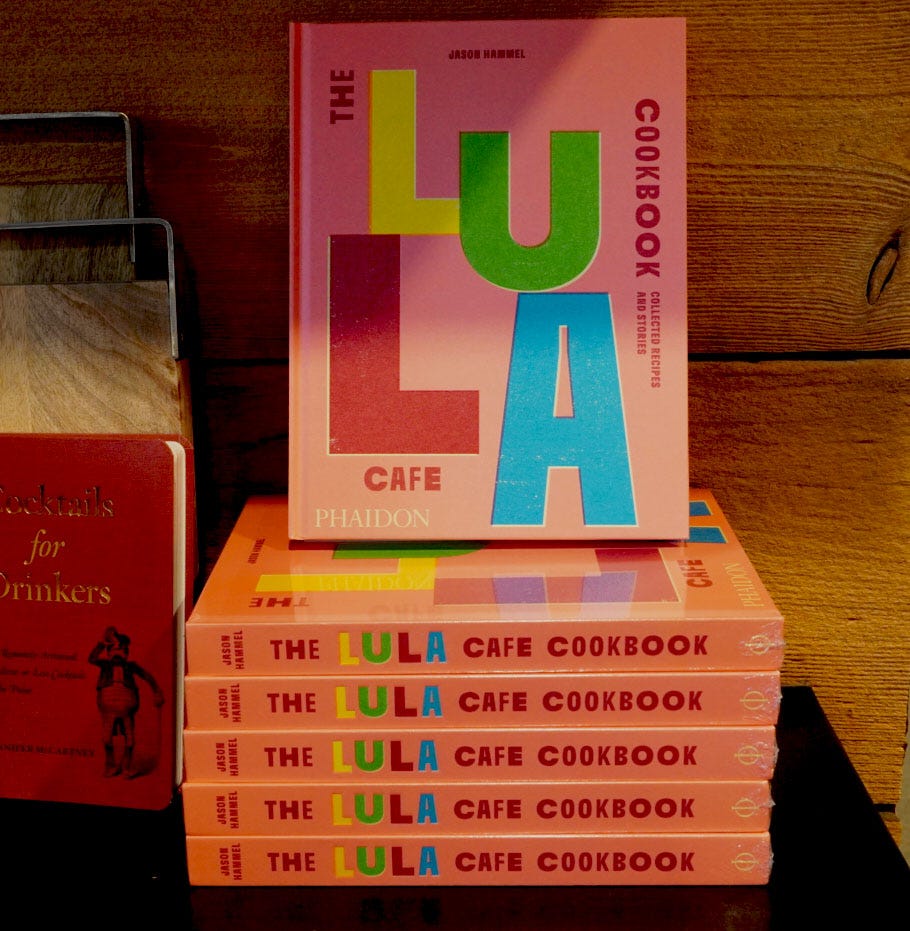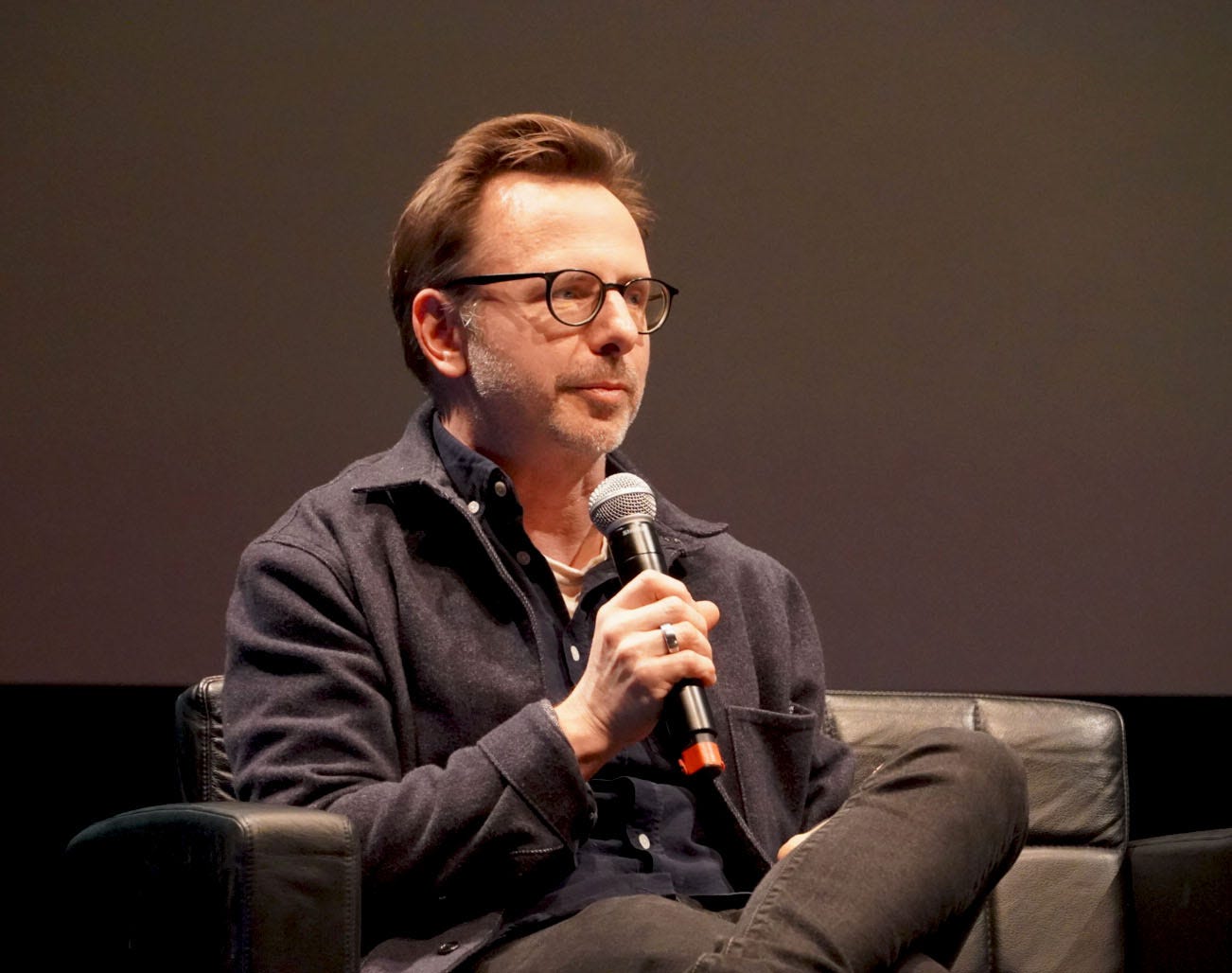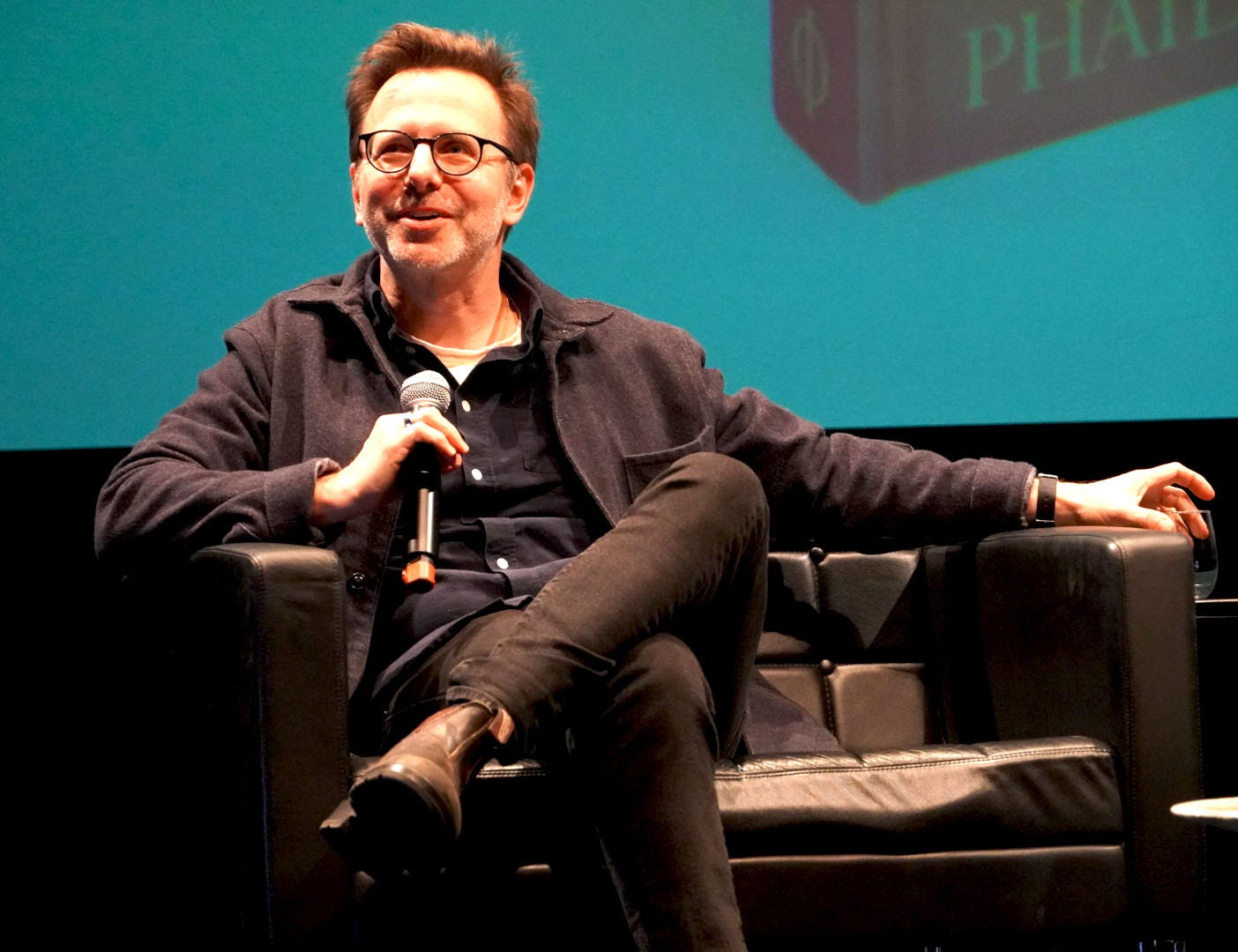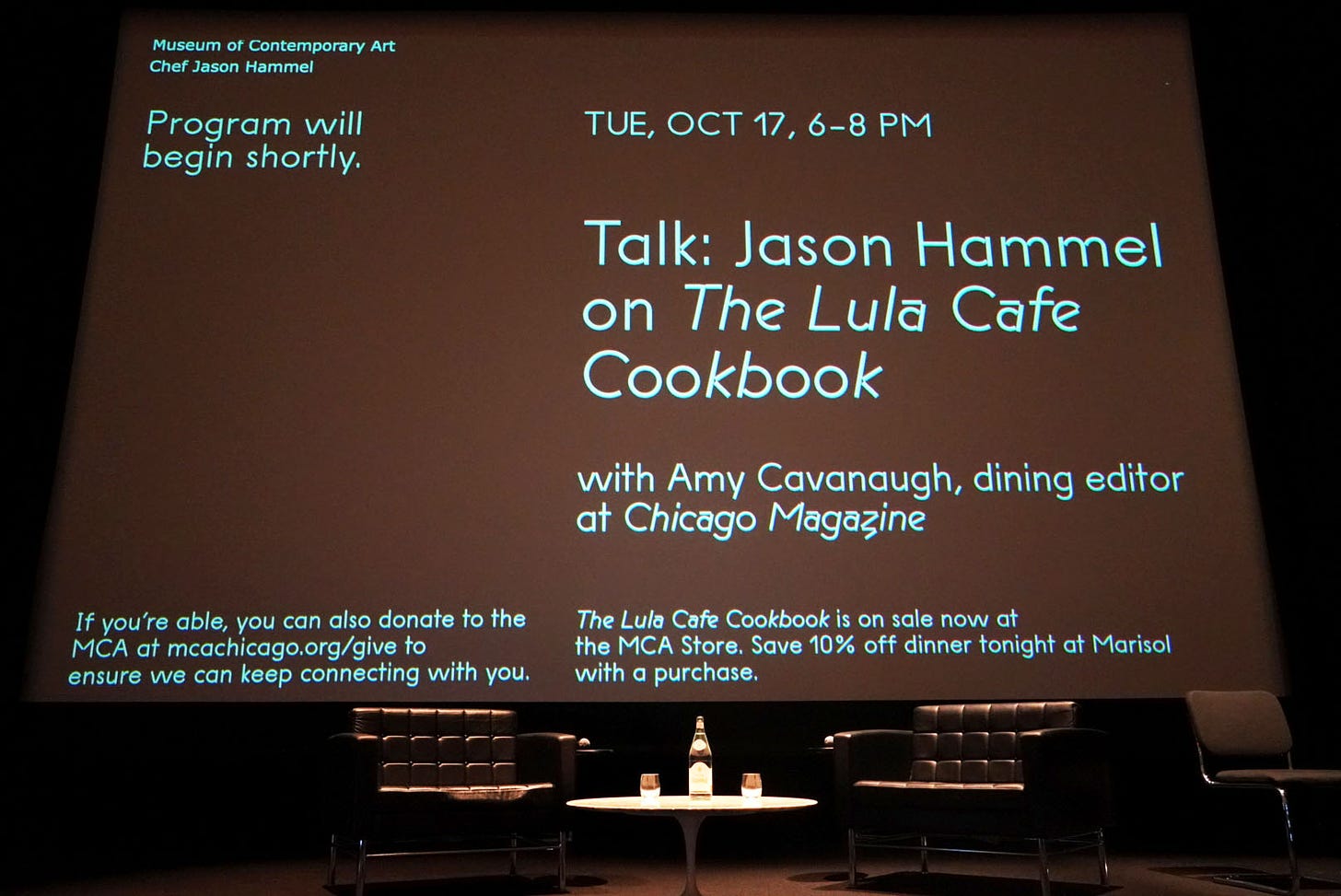Jason Hammel’s Thoughtfulness Lifts Cookbook
Friday’s Local Food Forum was a tribute to the generosity and collegialty of Chicago’s chef community. It led with a comment that Chef Jason Hammel made last Tuesday (October 17) during a presentation about his first book, The Lula Cafe Cookbook (Phaedon, 2023), in which he tells the stories behind the recipes at Lula Cafe, his legendary Logan Square restaurant that also is a farm-to-table pioneer.
But that was just one of the thoughtful and thought-provoking quotes from Jason’s conversation with Amy Cavanaugh, dining editor at Chicago Magazine.
A Connecticut native, Jason received an undergraduate degree in English from Brown University and a master’s degree in writing from Illinois State University. He moved to Chicago and moved into Logan Square because he’d learned there was a community of creatives there. But he also connected with Chicago’s restaurant world through a spot where he met musician and future wife Amalea Tshilds, with whom launched Lula Cafe in 1999 in the site of their former hangout.
Here are some thematic takeaways from the chat:
About How His Creative Spirit Led to His Career in Food
I moved here in the ‘90s. Before it was Lula, it was a cafe called Logan Beach. It's where I met my wife Amelea Tschilds and where we started this adventure together. At the time, that cafe meant everything to me. It was the center of my community, it was where I met all of the people that were important to me in my 20s.
It was also where I came upon the spirit of the makers, doers, creatives in the neighborhood. That really sort of lifted me up in my 20s and made me think that I could do whatever I set out to do. So I think Lula is special because it still has that energy of its origin that’s still kind of palpable now. It's maintained that kind of spirit of being 27, which I was, just giving it a shot and not having a concept or business plan or any of those kinds of things at the outset. So it maintains that community spirit, and it's now 24 years later, and I do feel it’s special in that sense.
How the Pandemic Prompted the Cookbook
I've always wanted to write something... But during the pandemic, I felt this urgency to capture what Lula was in my life and in our lives. It wasn't just me. It's my family. But it's also the people who are a part of Lula, all of them. The pandemic just changed our lives all of a sudden. So I felt this urgency and need to capture what had been happening on March 14, 2020. Then on March 15, it was gone. And the sense of protecting that was what really drove me in the writing. And once I started writing, it actually happened pretty quickly.
The Memories Behind the Cookbook’s Recipes
I could have done 90 other ones, easily. There are only one or two that had to be in the book. It's about what inspired me to write memories or ideas or thoughts about the dishes. So when I was flipping through the old notebooks and the old photographs, things would pop up in my mind about what I wanted to say about a particular dish, and that's what I gravitated toward. It might even have just been like, “Oh, you remember this one? Yeah, it was that night that it rained really hard and nobody was in the restaurant. And we came up with this dish, and we only like made two of them... It's very personal in that sense.
The Family Memories Behind His Love for Food
As a nuclear family, we ate together every night. It was really my grandmothers, I had three of them through marriage. All of them were really great cooks, but also just had really warm tables, especially my maternal grandmother. And I think looking back at just what food meant to me, I just fell in love with the idea of exploring it. And often you're exploring the dissolution of that heritage rather than the purity of it... And I got really interested in that and tried to explore it as much as possible in my personal life. And then when I became a chef, being Italian all of a sudden became way more important than it ever had been to me, strangely. My grandparents also owned a restaurant, it was a tiny four-booth diner, they didn't open it up until they were in their 50s, which is, you know, crazy. My grandparents had a lot of menial jobs, my grandfather was a truck driver and stuff like that. And they scraped together enough money to rent this little storefront, and then really put together a little life just cooking and serving. He was a cook, she was a server. And thinking back about these lineages, the secret histories of families that actually provide foundational possibility. It makes sense to me now. The same for Lea’s family, they owned several food businesses in Chicago. And so we both looked at each other like, “Okay, I guess we're in this as well.”
Cooking is Personal
For me, that's what I get out of being a chef. Even the relationships with the farmers are extremely personal. I find the idea of making a dish that someone else has made before me is a very human-like, interconnected thing, I find going to the market, buying a vegetable from somebody that I know, and then making that vegetable is a very interpersonal, connected human thing. And that's what brings value to my life. I don't know how else to say it. So to me, cooking is extremely personal. And then when you start to be a chef and you're teaching other people what to do, or leading a group of people, that's also personal... I do think I'm putting myself into the work.
On Writing, and Not Writing
I went to school for creative writing downstate. Then I moved to Chicago, I had a job as a cook, I was going to Logan Beach, the cafe where Lula is now, every day with the notebooks and trying to write this novel about living in Chicago in the ‘90s as a 20-year-old. We had that horrible heatwave in ‘95, and I was writing a novel about that. I was to 300 pages, and I was really serious. And when Lulu happened, I just stopped. I didn't do any more writing after that. That was a long time ago, I've been lucky to be able to write a few food pieces here and there over the years, but this is the first time I really was able to dig in and do something that was longer and more involved.
How a Broke College Student Became a Cook
It's very simple. I went to graduate school and if anybody's gone to graduate school, I ran out of money in, like, Week 2. So I turned to the guy next to me, his name is Frank, [and asked] “What do you do for money?” He's like, “I'm a cook at a restaurant. Come join me.” That was in Normal, Illinois. It's gone now, but I'll charitably call it an off-brand California Pizza Kitchen. So that was my first job cooking in a restaurant. And after that, I worked at another illustrious job, at TGI Friday’s. And then I came up to Chicago. And that's when I started hanging out at Logan Beach and met Lea and we transformed Logan Beach into Lula.
On Cooking, Time, and Being in the Moment
I hate measurements of time and cooking. It's something that I'm always talking to my mom about it, because she's like, “How long is it supposed to cook for?” I'm like, “Well, let's look at it and touch it and see what it's doing, and does it smell right?” She hates that. It's obviously relative in cooking, and you want to experience the transformation of an onion. Some things you can see through and some things you can’t. Those moments take time... We stamp [the date on] menus with a banker stamp. We've been doing it forever because we change the menu every day. When we started the restaurant in 1999, restaurants did not change their menu every day. You'd get them printed at a print shop... So the idea of doing the work, working with the farmers and making little changes, I knew they were important every single day, and then making sure that the stamp is there. The stamp is there to tell you that this is only for today, like the food that we're making is ephemeral... So recognizing how precious that moment is, and recognizing how precious moments are between people, and especially in a restaurant, where people are celebrating birthdays or first dates or just getting together with family or having a great conversation that you never expected to have, those things are not going to happen again.
And also, recipes aren't necessarily things that are there to recreate the dish, but to teach you how to create something else, because you can't go back and do the dish the same way again, it's never going to be exactly the same. So then you try something and it's new for you that day. And hopefully you're with people and having a conversation that makes that day really special as well.
Anchoring Community in the Restaurant
I might be the leader at Lula, but other people do the work. I'm there with them. But when when you walk in the dining room, and someone's like, “Oh, did you make this tonight,” and I'm like, “Me and 30 other people.” So recognizing the labor in the restaurant, and how important that every one of these jobs is. From the people that are there four or five in the morning to the people who close at night, trying to recognize how important each of those steps are, is what I've tried to do in the book. That's the first community that matters to me after my family, that first community is the community of people that work together. If you're talking about hospitality and care and wanting to create community, you start there. And if we can take care of the people who are working for us, the hope is that they'll take care of others.
Extending to the Broader Community
That just extends out into the neighborhood very easily until you start working with people who are doing social work projects in the neighborhood. We have a project where we cook meals for community dinners in Avondale every single Thursday. It's been three, four years that we've been doing it, 150 meals a week. We've just been doing that as part of our prep project. Everybody does it together. So that just came out of the beginnings of when you cook for each other. Every day we cook what we call the family meal, we put up food for the staff. That idea of putting up food for the staff just becomes the same idea as putting up food for the the church down the street on Kedzie that we work with. It sort of just transfers out like rings of community, out from the center.
—-
Jason then discussed the bond among those in Chicago’s chef community, which produced the quote I used to lead Friday’s Local Food Forum. Click the button below to access that issue in Friday’s newsletter…
… or on our new Local Food Forum website.







